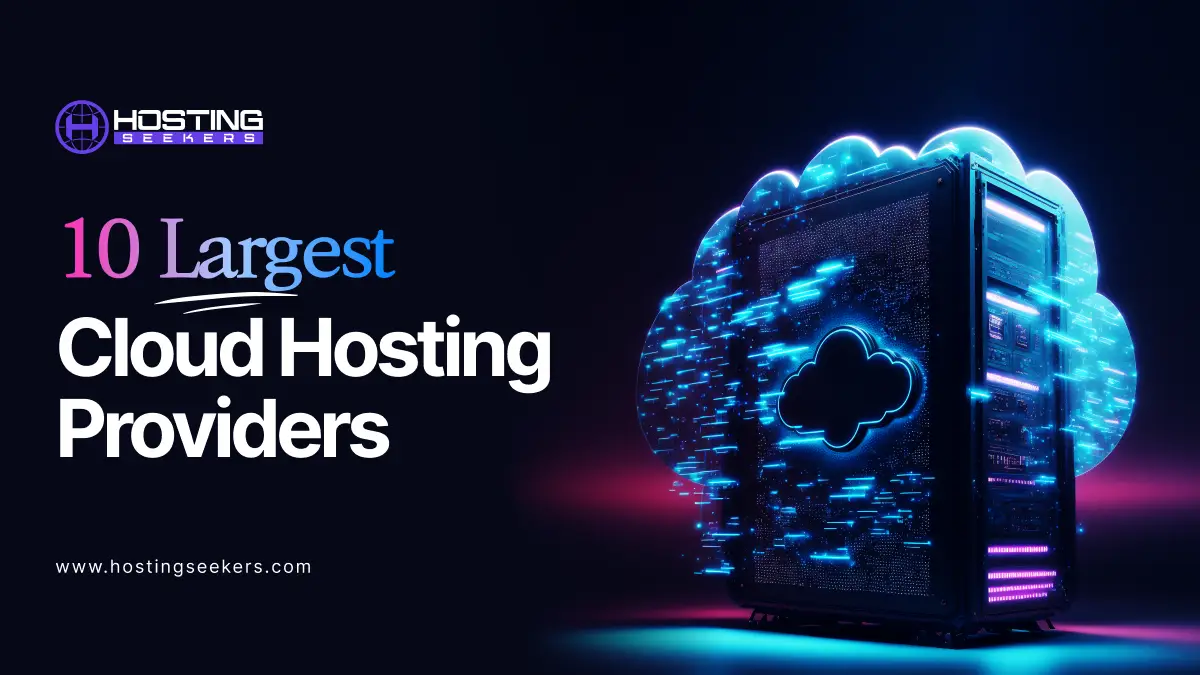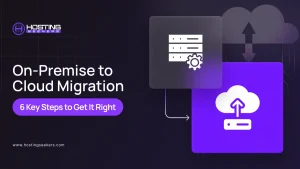
10 Largest Cloud Hosting Providers
Cloud Industry Updated on : January 28, 2026Cloud hosting provides flexibility to develop and manage your business effortlessly. It is a type of web hosting that uses a network of remote servers to manage, store, and process data. It functions through virtualization, which divides a physical server into cloud servers. This means you can easily scale your resources without worrying about hardware restrictions.
However, selecting a cloud hosting provider may be challenging due to the many available options. Let’s explore the 10 largest cloud hosting providers based on their features, benefits, reviews, and more.
What is Cloud Hosting?
In simple terms, cloud hosting means the website operates from separate physical servers, often called clustered servers. These servers may be in one data center or across various geographies.
You can easily interact with your website utilizing a standard cPanel to update the website, make vital changes, scale, and more under one interface.
Cloud Hosting Stats
In 2026, around 96% of organizations are predicted to use public cloud services, whereas 84% of businesses anticipate utilizing private cloud services. Moreover, around 51% of IT spending will move from traditional tools to cloud solutions. Moreover, 75% of companies prioritize building cloud-native apps, while 92% adopt multi-cloud strategies. (Source: network.org )
10 Largest Cloud Hosting Providers (Ranked)
1. Amazon Web services
Amazon Web Services is among the largest cloud hosting providers. Its market share now accounts for 30% of the global cloud infrastructure market for the public cloud. AWS provides many services, from basic storage and virtual private servers to AI, ML, and IoT solutions.
AWS is known for its global network of data centers, massive service portfolio, and enterprise-grade scalability. Its high-performance workloads, without compromising security, uptime, or flexibility, make it the first choice for businesses. Moreover, AWS is also a core driver that will reach $94 billion in enterprise spending in Q1 of 2026. (Source: crn.com)
Pros and Cons
| Pros | Cons |
| The Pay-as-you-go model provides flexibility. | Billing can be confusing. |
| Cost-efficiency for SaaS Hosting. | Time-consuming analysis. |
| Best security and compliance. | Fewer security insights. |
2. Microsoft Azure
Azure is another cloud hosting provider. It’s a cloud platform developed to help businesses operate apps, scale workloads, and store data across a global network. It offers services from AI tools to hybrid cloud and DevOps support.
You can develop and operate apps across various environments by utilizing Azure Stack, from data centers and edge locations to remote offices or even the public cloud. Microsoft’s private cloud capabilities cover IoT implementation, infrastructure, hyper-converged, and the Azure Stack Hub for operating autonomous cloud instances on-premises.
Pros and Cons
| Pros | Cons |
| It provides an integrated environment. | Cost management can be challenging |
| It’s a highly scalable platform. | Migrating to another cloud provider can be difficult. |
| It provides robust security. | Inconsistent UI and automation options. |
3. Google Cloud
Google Cloud Platform is among the biggest cloud services. It is a global cloud infrastructure and services provider trusted by large businesses like PayPal, Spotify, and NASA to boost their digital transformation capabilities.
It delivers a full suite of cloud solutions, including networking, AI, computer storage, and machine learning, all developed on the same infrastructure that powers Gmail, YouTube, and Google Search.
Also, services like Tensor Processing Units (TPUs), Vertex AI, and BigQuery make it a recommended choice for companies operating data-intensive apps or developing custom AI models.
Pros and Cons
| Pros | Cons |
| Robust GCP security features | Complex pricing dynamics. |
| Security command center | Restricted support offerings. |
| Easy Identity and access management | Concerns about security risks. |
4. IBM Cloud
IBM Cloud is a flexible cloud hosting and computing service provider developed for businesses requiring private and public capabilities. It provides clustered solutions that allow you to personalize your web hosting servers by selecting from more than 11 million configurations. You can also choose single, dual, or quad Intel processors.
It supports hybrid cloud migration abilities suitable for businesses with legacy systems or regulatory needs that restrict complete cloud migration. Moreover, IBM Cloud offers robust container orchestration, AI integration via Watsonx, and other strong compliance features. Moreover, the global data centers ensure low-latency access, while the in-built WatsonX AI portfolio allows partners to tune, train, and distribute models with generative AI and machine learning.
Pros and Cons
| Pros | Cons |
| Provides high flexibility with bare metal servers | Data transfer can be challenging. |
| Global data center presence guarantees uptime. | Large data backups can slow down the internet. |
| Robust control over infrastructure setup. | Lack of support. |
5. Oracle Cloud
Oracle Cloud Infrastructure (OCI) delivers high-performance computing and enterprise-grade services developed for large-scale workloads. It’s known for its estimated pricing, robust security, and best integration with Oracle’s database and enterprise software stack.
OCI’s hybrid and multi-cloud architecture allows businesses to operate apps across Oracle Cloud, on-premises, and other cloud providers. Security is another vital feature that makes Oracle Cloud a cloud hosting provider.
Pros and Cons
| Pros | Cons |
| It provides high-performance and stability | Complex migration process. |
| OCI’s security features include data that is safe for data masking. | Oracle cloud infrastructure is considered expensive. |
| Autonomous data and reporting services | It lacks integration capabilities. |
6. Kamatera
Kamatera is a global cloud services provider that provides personalized VPS hosting solutions for small—to medium-sized businesses. The platform offers flexible cloud servers that can be configured with different combinations of RAM, CPUs, storage, and operating systems, including multiple Linux distributions and Windows.
Users can also easily scale resources up or down in real-time through an intuitive management console, enabling precise control over server configurations. Moreover, add-on features include firewalls, block storage, and a virtual private cloud that serves diverse computing needs like web hosting, application development, and database management.
Pros and Cons
| Pros | Cons |
| Complete personalized server configurations. | Not beginner-friendly, needs expert knowledge. |
| Fast performance with zero downtime. | Lack of a Knowledge base. |
| Global data center availability. |
7. Atlantic.Net
Atlantic.Net is among the top cloud hosting providers that provide a wide array of features that streamline online operations at a minimal price. It allows businesses and organizations to enjoy the flexibility of adjusting their resources in real-time, optimizing their infrastructure to meet the requirements.
This adaptability, paired with enhanced data protection measures, empowers organizations to run more efficiently while decreasing expenses. Also, its user-friendly cloud interface and consistently robust support are the main reasons why businesses of all sizes use Atlantic.Net.
Pros and Cons
| Pros | Cons |
| Easy to use for beginners | A dedicated server may be costly. |
| Robust performance with low downtime. | Complex compliance and governance rules. |
| HIPAA, HITECH, PCI compliant. |
8. Cloudways
Cloudways is a managed cloud hosting solution that provides automated backups, monitoring, and regular security fixes. Its packages include 24/7 live chat, ticketing support, and alerts for operational factors like security and performance. Businesses looking for an immediate response, robust support, or advanced technical skills can easily update or upgrade to an advanced or premium support plan.
Pros and Cons
| Pros | Cons |
| Provides easy VPS hosting management. | The backend is not intuitive |
| Cost-effective pricing | Not very user-friendly. |
| Built-in scalability |
9. IONOS
IONOS is another of the largest cloud hosting providers with the best support system. It offers scalable computing services with full scaling and root access. Utilizing a drag-and-drop interface, it can design and deploy a cloud cube instance within minutes.
IONOS also guarantees 99.99% uptime. It allows you to test your cloud server for free. Many packages include starting credits, which allow you to pay only for the resources or time you use.
Pros and Cons
| Pros | Cons |
| Auto daily updates | Lack of migration services. |
| Windows and Linux hosting. | Limited customized servers. |
| It comes with a money-back guarantee. |
10. Dreamhost
Dreamhost is another large cloud hosting provider with complete control over its data, embracing transparency and choice. With an open-source foundation, it ensures flexibility and trust, while it ensures trust and flexibili Also, it’s user-friendly, and cPanel simplifies website management for users at all levels.
Its lightning-fast server has root access, SSD storage, and networking, which are powered by open APIs through OpenStack. Moreover, the pricing model is cost-effective; you pay for the resources you use.
Pros and Cons
| Pros | Cons |
| High speed and performance. | Add-on charges for some security tools. |
| Easy setup. | Data centers are located in the US. |
| 24/7 support. | Extra pay for phone support. |
11. SiteGround
SiteGround is a scalable cloud hosting provider. Its cloud platform provides robust dedicated resources and is optimized for effectiveness and speed, guaranteeing your website’s top performance.
With SiteGround, our cloud platform is ready for your growth. You can add RAM and CPU at any time with a single click. You can also use our auto-scale option, which automatically adds more resources during unexpected traffic spikes, dealing with downtime and traffic loss.
Pros and Cons
| Pros | Cons |
| Daily auto backups. | Restricted scalability options. |
| Integrated Cloudflare CDN improves Global content delivery. | High Renewal charges. |
| AI-driven anti-bot system protects against suspicious traffic. | Limited storage for lower-tier plans. |
Largest Cloud Hosting Providers: Comparison Table
| Cloud Hosting Provider | Rating | Pricing | Best Features |
| Amazon Web Services | 4.6 | Pay-as-you-go model |
|
| Microsoft Azure | 4.5 | Pay-as-you-go |
|
| Google Cloud | 4.5 | Free/ Request on Quote comes with $300 free credit |
|
| IBM Cloud | 4.5 | Pay-as-you-go |
|
| Oracle Cloud | 4.3 | Pay-as-you-go
|
|
| Kamatera | 4.2 | Starting from $4 / mo, (30-day free trial) |
|
| Atlantic.Net | 4.6 | General Purpose Plan Starting from $10/mo ($0.0149/hr) for Linux Os and $16.5/mo ($0.0246/hr) for Windows OS |
|
| Cloudways | 4.3 | Starting from $14/mo (3-day free trial) |
|
| IONOS | 4.0 | pay-as-you-go, basic cubes starting from $5.76 per 30 days |
|
| Dreamhost | 4.3 | Starting from $4.50 |
|
| SiteGround | 4.3 | Starting from $100/mo |
|
How to Choose the Right Cloud Hosting Provider?
Checking features, pricing, performance, guarantee, and more is vital when selecting a Cloud hosting provider. Here’s a step-by-step guide for choosing the best cloud hosting provider.
1. Check for Reliability
Reliability always matters when selecting cloud hosting. Your apps and data should be accessible 24/7, as even a few minutes of latency can result in significant loss. Check for providers with a proven track record of high redundancy and availability.
2. Security
Security should always be prioritized when selecting a cloud hosting provider. The provider should offer robust security measures to protect your apps and data from various risks.
Always check for providers that provide features like encryption at rest and in transit, daily security audits, and compliance with industry standards.
In addition, check for providers that provide advanced security options, such as Server Secure Plus for Windows and Imunify360 Plus for Linux, Cloudflare, or any other operating system.
3. Performance
Your cloud infrastructure’s performance mainly affects your apps’ user experience. A high-performing cloud environment ensures your apps can operate smoothly, load quickly, and respond effectively to user interactions.
When analyzing performance, consider factors like network latency, I/O operations per second (IOPS), and CPU performance. Most providers provide different performance tiers, so ensure that you select one that streamlines your app’s needs.
4. Pricing and Flexibility
Pricing is another vital aspect when selecting a cloud hosting provider. Look for providers that offer flexible pricing options, enabling you to pay only for the resources you consume.
Consider a provider that offers on-demand pricing for variable workloads and reserved instances for long-term usage. Some providers also provide spot instances, which offer significant savings for interruptible workloads.
5. Support and Customer Service
Even with the most relevant cloud infrastructure, issues can arise. When they do, you may want a knowledgeable and responsive support team. Check the quality of support offered by the provider.
Go for providers that offer 24/7/365-day support. Consider the response time for different severity levels and whether they provide a dedicated account manager with robust support. It’s also worth checking if they offer extensive documentation, community forums, and other tutorials to help you resolve issues independently.
Conclusion
The largest cloud hosting providers, such as Amazon Web Services (AWS), Microsoft Azure, Google Cloud Platform (GCP), IBM Cloud, and Oracle Cloud, are shaping the future of digital infrastructure. These companies offer scalable, secure, globally distributed services that power everything from startups to enterprise-level applications.
Their dominance is driven by continuous innovation, massive data center networks, competitive pricing models, and extensive service offerings, including AI, machine learning, and multi-cloud support. Choosing the right provider depends on your needs, whether cost-efficiency, performance, compliance, or specialized tools.




